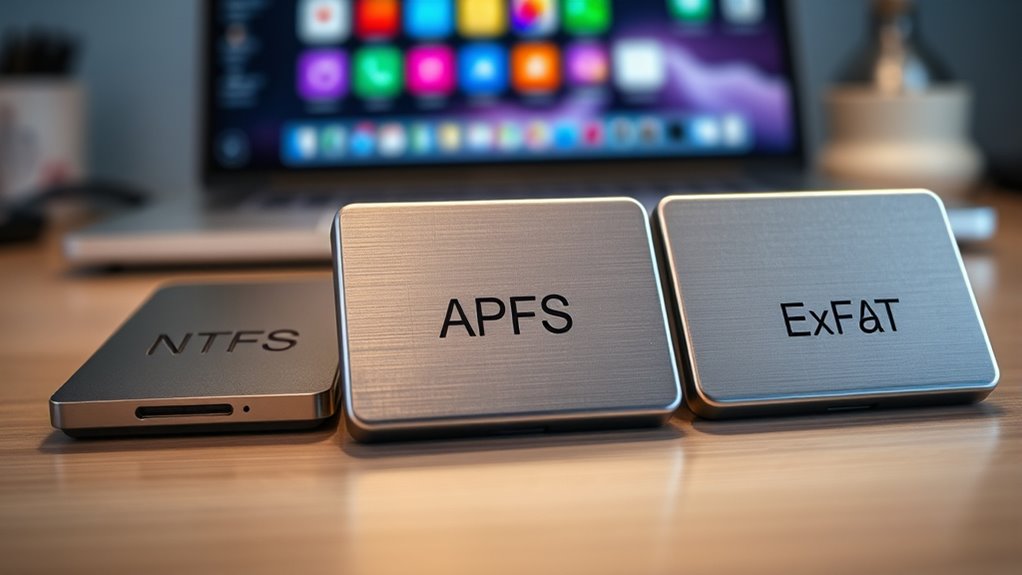Choosing between NTFS, APFS, and exFAT depends on your device ecosystem and storage needs. If you’re mainly on Windows, NTFS offers security and high performance, but it’s limited on macOS. For Apple devices, APFS provides fast access and advanced features. If you need cross-platform compatibility for external drives, exFAT is your best bet. To make the right choice, consider how you’ll use your storage and share data—more details await.
Key Takeaways
- Choose NTFS for Windows-only environments requiring security, large files, and advanced permissions.
- Opt for APFS when using macOS or iOS devices needing fast performance, encryption, and snapshots.
- Use exFAT for external drives shared across Windows and macOS, supporting large files without journaling.
- Consider third-party software if cross-platform support for NTFS or APFS is necessary on non-native systems.
- Prioritize device ecosystem and data security needs when selecting a file system for cross-device compatibility.

SABRENT USB4 NVMe SSD Enclosure – Tool-Free USB 4.0 M.2 PCIe 4.0 x4 External SSD Case, 3900MB/s, Thunderbolt 3/4 & USB-C Compatible, for 2230/2242/2260/2280 Drives (EC-U4TN)
Blazing-Fast USB4 Performance: Transfer files at up to 3,900 MB/s with USB4 or 2,700 MB/s with Thunderbolt 3/4....
As an affiliate, we earn on qualifying purchases.
Understanding NTFS and Its Windows Dominance

NTFS (New Technology File System) is the primary file system used by Windows, and it dominates the platform due to its robust features and reliability. You benefit from full read and write support, which makes managing files efficient and straightforward. NTFS’s journaling feature helps protect your data during unexpected shutdowns by tracking changes before committing them permanently. It also manages file permissions, enhancing security especially in multi-user environments. With a maximum file size of 16 TiB and volume size up to 8 PiB, it handles large data sets easily. However, on macOS, NTFS is read-only by default without third-party drivers, limiting its cross-platform compatibility. Overall, NTFS’s combination of security, stability, and scalability makes it the go-to file system for Windows-based storage solutions.
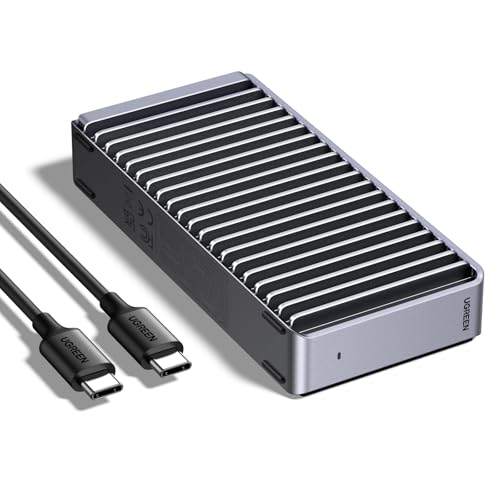
UGREEN 40Gbps M.2 NVMe Enclosure with Aluminum Double-Sided Fin Heat Dissipation, No Noise External SSD Case Compatible with Thunderbolt 4/3/USB4/3.2/2.0 M1 M2 Pro/Max (SSD Not Included)
Transmission files in seconds: This product is equipped with the ASM2464PD chip, and the maximum speed can reach...
As an affiliate, we earn on qualifying purchases.
Exploring APFS and Its Optimization for Apple Devices

Apple File System (APFS) is designed specifically to optimize storage on Apple devices, offering significant performance benefits for solid-state drives and encrypted data. You’ll notice faster file access, space sharing, and efficient cloning of files and directories. Its journaling and snapshot features enhance data integrity and simplify backups, especially with Time Machine. Keep in mind, APFS isn’t compatible with Windows without third-party software. Here are some key points:
APFS boosts performance, security, and data integrity on Apple devices with fast access, space sharing, and efficient cloning.
- Optimized for SSDs, reducing wear and improving speed
- Supports encryption for enhanced security
- Enables space sharing among multiple volumes
- Allows quick cloning without duplicating data
- Limited to macOS 10.13 and later, not supported on older versions
This makes APFS ideal if you’re fully embedded in the Apple ecosystem and need high performance combined with data protection.

Cable Matters 40Gbps Portable USB4 / Thunderbolt 4 SSD Enclosure for M.2 NVMe SSD - Up to Read:3800MB/s, Write:3600MB/s, NVMe Enclosure, Tool-Free, Intelligent Cooling, Thunderbolt 4/5 Compatible
Lightning-fast 40Gbps NVMe Enclosure: This USB4 NVMe SSD enclosure offers ultra-fast 40Gbps data transfer, perfect for large file...
As an affiliate, we earn on qualifying purchases.
The Versatility of Exfat for Cross-Platform Compatibility
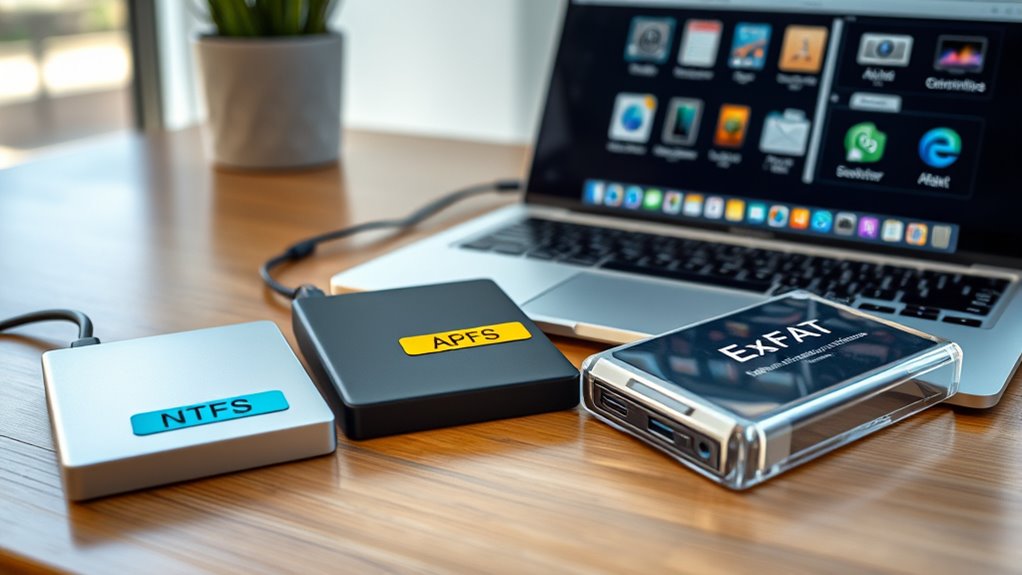
Because of its universal compatibility, exFAT is widely regarded as the ideal file system for external drives and flash media that need to work seamlessly across Windows and macOS. It supports large files and volumes, surpassing FAT32’s 4 GB limit, making it perfect for videos, backups, and large datasets. Its straightforward read/write support on both operating systems eliminates the need for extra drivers or software. However, exFAT doesn’t include features like journaling or permissions, which might impact data integrity and security. Despite this, its simplicity and broad compatibility make it a popular choice for USB drives, SD cards, and external hard drives used across different devices. If you need easy, cross-platform file sharing without sacrificing large file support, exFAT offers a reliable solution. Additionally, because of its broad device support, exFAT is often recommended for various media and storage solutions spanning multiple platforms. Its compatibility with multiple operating systems further enhances its utility in diverse environments.

WAVLINK 40Gbps PCIe NVMe SSD Enclosure, USB4 External M.2 NVMe SSD Enclosure, for B+M/M-Key PCIe SSD 2280 Size, Tool-Free Installation, Compatible with Thunderbolt 4/3/USB4/USB C, SSD Not Include
【Leading the Industry with 40Gbps USB4 Speeds】Equipped with a USB4 port, the WAVLINK enclosure offers lightning-fast data transfer...
As an affiliate, we earn on qualifying purchases.
Comparing Performance and Limitations of Each System

When comparing the performance and limitations of these file systems, it’s clear that each has strengths suited to specific environments but also notable drawbacks.
- NTFS offers strong journaling, permissions, and security, making it ideal for Windows but limited on macOS without third-party tools. Cross-platform compatibility remains a challenge for NTFS, restricting its seamless use across different operating systems.
- APFS excels with SSD optimization, encryption, and snapshots, yet it’s incompatible with Windows, restricting cross-platform use. Its design is optimized for Apple devices, enhancing performance and security on macOS and iOS.
- exFAT supports large files and volumes across both Windows and macOS but lacks journaling, risking data integrity. This makes it suitable for portable drives and external storage where simplicity is needed.
- NTFS’s filename limits and permissions enhance organization but can hinder flexibility in certain scenarios. These restrictions may affect workflows that require more dynamic file naming or sharing.
- APFS and exFAT handle modern storage needs better than FAT32, which is outdated for large files and newer devices. FAT32’s limitations in maximum file size and partition size make it less suitable for current high-capacity storage solutions.
- Incorporating content relevance and authority into file system choice can help optimize data management and security strategies. Selecting the appropriate file system based on specific device and use-case requirements is crucial for maintaining efficiency and data safety.
Compatibility Considerations for Different Operating Systems

When choosing a file system, you need to consider how well it supports both your operating system and others you’ll share data with. Native support offers the best performance and reliability, but cross-platform compatibility can require compromises or additional software. Understanding the strengths and limitations of each system helps ensure smooth file sharing and access across devices.
Cross-Platform Read/Write
Cross-platform read/write compatibility is essential for users who need to share and access files seamlessly across different operating systems. To accomplish this, exFAT is your best choice, offering native read/write support on both Windows and macOS without extra software. NTFS works well on Windows but requires third-party drivers for write access on macOS. APFS is optimized for Macs and doesn’t support Windows natively, limiting cross-platform use. Keep in mind:
- exFAT supports large files and volumes across OSs.
- NTFS offers robust security but limited write support on macOS.
- APFS excels on Macs but needs third-party tools to work with Windows.
- FAT32 is outdated, with a 4GB file limit, unsuitable for modern needs.
- Using external drives with cross-platform file systems ensures easy sharing between systems.
Choosing the right filesystem depends on your device ecosystem and sharing requirements. Additionally, understanding file system compatibility can help you make more informed decisions for your storage solutions.
Native System Support
Different operating systems have varying levels of native support for file systems, which can considerably impact your ability to access and manage data seamlessly. Windows fully supports NTFS, allowing complete read/write access, but macOS can only read NTFS drives without third-party software. Conversely, macOS natively supports APFS, optimized for Apple devices, but Windows requires additional tools for full access. exFAT offers broad compatibility, with native read/write support on both Windows and macOS, making it ideal for external drives. However, it lacks features like journaling, which affects data integrity. Your choice depends on your device ecosystem and whether you need seamless native support or are willing to use third-party solutions. Compatibility considerations are vital to ensure smooth data access and management across your devices. Additionally, understanding file system features such as journaling and metadata handling can help you select the most suitable format for your specific needs. Selecting a file system with robust data protection can further safeguard your information during transfers and storage, especially when considering data integrity and the potential risk of data loss.
Ideal Use Cases for NTFS, APFS, and Exfat
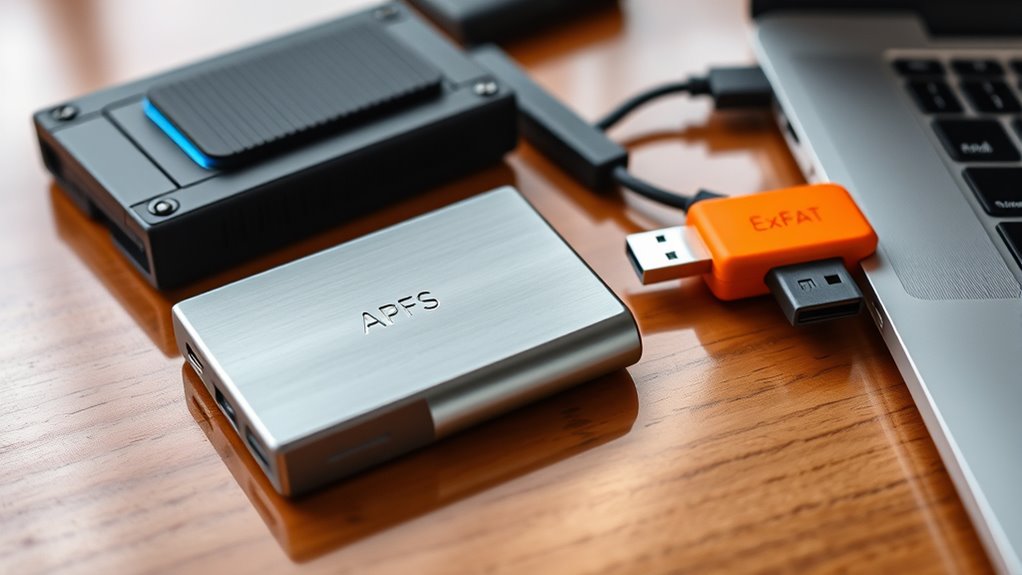
Understanding the ideal use cases for NTFS, APFS, and exFAT helps you select the right file system for your needs. Each offers unique advantages for Windows data storage, Apple ecosystem optimization, or cross-platform compatibility. Picking the right one guarantees your data is secure, accessible, and efficiently managed across devices. For example, beginners guides can assist in understanding how to identify the appropriate file system for your specific device requirements. Additionally, the integration of AI in mobile devices is projected to influence how storage systems are optimized for performance and security. Recognizing how file system architecture impacts data management can further aid in making informed decisions about storage solutions. Understanding the differences in file system compatibility is essential for ensuring seamless data transfer between various operating systems. Moreover, understanding how storage longevity varies among file systems can help in planning for long-term data preservation.
Windows Data Storage
Choosing the right file system for Windows data storage depends on your specific needs. If you’re managing large files or complex permissions, NTFS is your best choice. It offers robust security, journaling, and high volume support. For external drives or removable media used mainly with Windows, exFAT provides compatibility without sacrificing large file size limits. It’s ideal for sharing files between devices. If you’re working within a Windows environment that prioritizes security and data integrity, NTFS is suitable. Use exFAT for portable storage when cross-platform access is necessary. Keep in mind that NTFS has limited macOS write support, and exFAT lacks journaling features, so consider your backup needs.
- Large file handling
- Security and permissions
- Cross-platform compatibility
- External drive use
- Data integrity requirements
Apple Ecosystem Optimization
In the Apple ecosystem, selecting the right file system depends on your specific workflow and device compatibility. If you primarily use Macs, APFS offers optimized performance, encryption, and seamless backups. For external drives shared with Windows, exFAT provides easy read/write access without additional software. NTFS isn’t ideal for Macs unless you install third-party drivers, so it’s better suited for Windows environments. Use the table below to match your needs:
| Use Case | Recommended File System | Limitations |
|---|---|---|
| Mac-only storage | APFS | Limited Windows compatibility |
| External drive for Windows | exFAT | No journaling, potential data risks |
| Cross-platform large files | exFAT | Lacks advanced features |
| Mac backup (Time Machine) | APFS or HFS+ | NTFS unsupported for backup |
Cross-Platform Compatibility
To guarantee seamless data sharing across different devices, selecting the right file system is essential. For cross-platform compatibility, exFAT is your best choice, offering read/write support on both Windows and macOS without extra software. It handles large files and volumes, making it ideal for external drives, USBs, and SD cards. However, it lacks journaling and advanced security features, which can affect data integrity. NTFS works well on Windows but needs third-party tools for full macOS write support. APFS is optimized for Macs, with features like snapshots, but isn’t natively compatible with Windows. Consider your device ecosystem, file size needs, and whether you require native support for seamless sharing.
- exFAT supports both Windows and macOS natively
- No journaling or permissions on exFAT
- NTFS on Windows, limited on macOS without drivers
- APFS is exclusive to Apple devices
- exFAT is ideal for external storage and large files
Managing Large Files and Storage Volumes Effectively
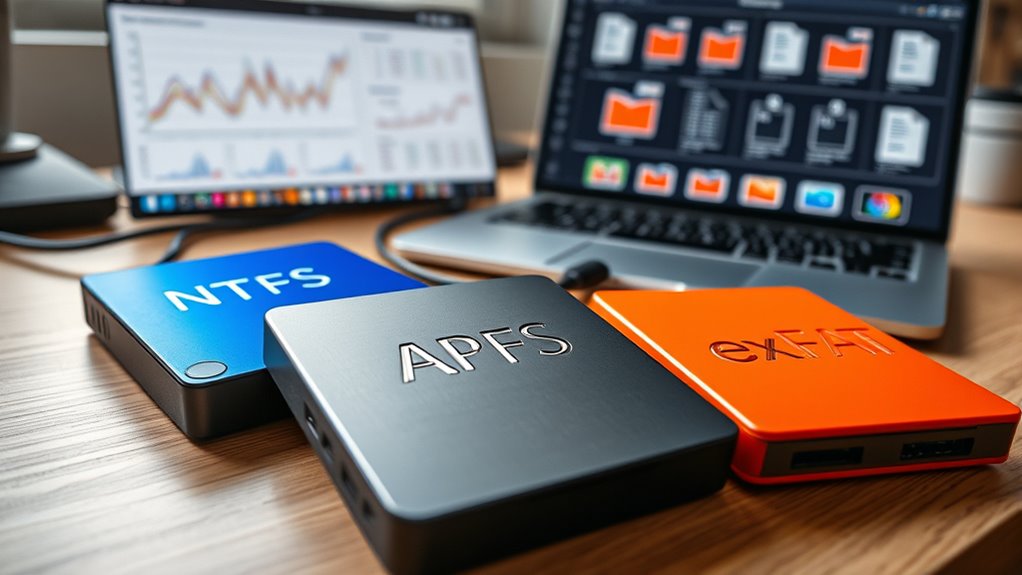
Managing large files and storage volumes requires selecting a file system that can handle high-capacity data efficiently. NTFS supports files up to 16 TiB and volumes up to 8 PiB, ideal for large data needs on Windows. APFS optimizes SSD performance and supports snapshots, making it suitable for Mac users with big storage. exFAT allows cross-platform access to large files and volumes, supporting files over 4 GB and volumes beyond 128 PB. Use the table below to compare their capacities and features: file system capacities. Additionally, heat pump noise levels and other factors can influence overall system performance and suitability for your specific needs.
Security, Permissions, and Data Integrity Features

File systems play a crucial role in safeguarding your data through built-in security and permission features. NTFS, APFS, and exFAT each offer different levels of protection. NTFS supports detailed permissions, allowing you to control access at the file and folder level, and checks data integrity with journaling. Journaling helps prevent data corruption in case of unexpected shutdowns. A well-designed file system also incorporates sound design principles to optimize data flow and protection mechanisms. NTFS provides granular permissions and encryption options. APFS supports strong encryption and snapshot backups, ensuring data remains secure and recoverable. exFAT lacks native permissions and journaling, making it less reliable for sensitive data. A comprehensive understanding of data protection strategies enhances the reliability of your storage solutions. Additionally, audit capabilities in some file systems allow for monitoring and tracking access, further strengthening data security. – NTFS provides granular permissions and encryption options. – APFS supports strong encryption and snapshot backups. – exFAT lacks permissions and journaling, risking data integrity. – NTFS maintains detailed access control for multi-user environments. – APFS ensures data security through encryption and versioning.
Making the Best Choice Based on Device Ecosystem and Needs

Choosing the right file system depends heavily on your device ecosystem and specific needs. If you’re mainly on Windows, NTFS offers security and large volume support but requires third-party drivers for Mac. Mac users benefit from APFS’s optimized performance and snapshots, but it’s incompatible with Windows without software. For cross-platform use, exFAT provides seamless read/write access on both systems, ideal for external drives and large files. Consider your primary device and data requirements: astrological compatibility can also influence personal preferences and confidence in data management.
| Device Ecosystem | Recommended File System | Key Limitation |
|---|---|---|
| Windows-only | NTFS | Limited macOS support |
| macOS-only | APFS | No Windows support |
| Cross-platform | exFAT | No journaling |
| Older devices | FAT32 | 4GB file limit |
| Large data needs | NTFS or exFAT | Compatibility considerations |
Frequently Asked Questions
Can I Upgrade My Current File System Without Data Loss?
Yes, you can upgrade your current file system without data loss, but it depends on the specific system and method. Always back up your data before starting any upgrade. Use built-in tools or third-party software designed for safe file system conversions. For example, you might convert FAT32 to exFAT or upgrade from HFS+ to APFS on Mac. Proceed carefully to avoid accidental data loss during the process.
What Are the Best Recovery Options for Corrupted NTFS or APFS Drives?
When facing a troubled drive, don’t panic—try using data recovery software like Recuva or Disk Drill, which can often retrieve lost files from corrupted drives. If that doesn’t work, consider professional data recovery services, especially if your data is valuable. Regular backups and avoiding further use of the drive can prevent additional damage. Acting swiftly increases your chances of restoring your data successfully without further risk.
How Do File System Choices Impact Backup and Data Recovery Strategies?
Your choice of file system directly influences your backup and data recovery strategies. For instance, systems with journaling, like NTFS and APFS, help prevent data loss during crashes, making recovery easier. However, compatibility issues may require specialized tools for recovery across different OS. Using widely supported formats like exFAT simplifies sharing and backup processes. Always guarantee your backup method aligns with your file system’s features to maximize data safety and recovery options.
Are There Performance Differences When Using External Drives With Different File Systems?
You’ll notice performance differences based on the file system you choose for your external drives. Drives formatted with APFS tend to offer faster read/write speeds, especially with SSDs, thanks to optimization for solid-state storage. ExFAT provides good speed and compatibility across platforms but might lack some advanced features, which can slightly impact performance with large files. NTFS offers robust security and journaling but may perform slower on non-Windows systems.
How Do File Systems Affect Compatibility With Virtualization or Emulation Software?
You might find that your choice of file system unexpectedly affects virtualization or emulation software. When your host and virtual environments use incompatible file systems, it can cause read/write issues or slowdowns. For seamless operation, you need a compatible setup—like using exFAT for shared drives—so your software runs smoothly across systems. Picking the right file system guarantees your virtual tools work efficiently without unexpected glitches or data mishaps.
Conclusion
Choosing the right file system is like selecting the perfect passport for your digital adventures. NTFS, APFS, and Exfat each open different doors—whether you’re steering Windows, Apple, or cross-platform worlds. By understanding their strengths and quirks, you can smoothly sail through data management, security, and compatibility. So, pick the one that best fits your device ecosystem, and let your storage journey be effortless and seamless as a well-orchestrated symphony.
